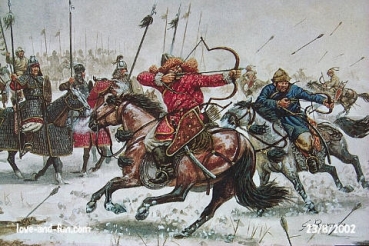1200-1600 AD
Of course, the first
really big name to come out of Central Asia was Genghis Khan. This
illiterate son of a low-level tribal chief managed to get most
of the Mongols to stop killing each other and start killing other
folks instead. They burst out of what is now Mongolia and far western
China in the 12th century, an army never more than 200,000 strong, yet
so fierce and so tough that entire cities would lay down their arms
and surrender at the news that the "soldiers of the
Antichrist" were on their way.
I don't mean to
glorify the killing and terrible destruction they caused, but it is
worth noting in some ways, perhaps as a lesson for our own times. The
city of Merv, for example, in what is now eastern Turkmenistan,
resisted the advance of one Mongol army. After several months of
siege, the exhausted defenders gave up. The Mongols took every
survivor out into the desert, man, woman and child alike, and cut
their heads off. They piled 50,000 skulls on the road as a warning,
and totally obliterated the city, a city which had been a major
religious, trading, and learning center. To the surrounding countries,
this would have been comparable to learning that the Nazis paved over
Paris when they conquered it in 1940.
Yet oddly, the Mongols
were quite tolerant once they established their reign. They allowed,
if not encouraged, all religions, enforced a fairly enlightened (for
the 13th century) set of laws, and promoted safety and relative
freedom. During the "Pax Mongolica" from about 1250 AD to
1400 AD, it was said that a lone woman could walk in complete safety
from the Alps to the Pacific, not that many did so.
Within a half century,
the Mongols controlled the world from the shores of the Pacific Ocean
on China's east coast, to the Danube in Hungary, and from the Arctic
Circle to the Himalaya. This was the largest world empire ever
established, before or since. Fully two thirds of human population was
in thrall to the Mongol empire. By 1242, fifteen years after Genghis'
death, Mongol armies crossed the mountain passes of eastern
Europe and conquered the Baltic states, Hungary, most of inhabited
Russia, and what is now Poland. They crossed the Danube and surrounded
Vienna. They captured and destroyed the Russian city of Kiev. They had
their sights on the rest of continental Europe and that little island off the coast of
Belgium If you're not
sure what I'm referring to, take a quick glance at a map. See what's
northwest of Belgium?...)
But back in the remote
Mongol capital of Qaraqorum, the Great Khan Ogedei, a son of Genghis,
suddenly died. The other sons and nephews turned back to
Qaraqorum for the political in-fighting that marked the succession
process. Had it not been for this minor event, there's a good chance
most of us here in the West might be speaking Chinese
Mongolian ( I've been corrected..) instead of
English.
All good things must
end, I suppose. By around 1500 AD the Mongol empire had withered away,
or more accurately, was absorbed by its' subjects. Grandsons of
Genghis ruled India ( Babur, founder of the Moghul Empire) and
China (Kublai Khan, friend of Marco Polo), and other descendants
governed Persia, Turkey, Manchuria, much of what is now Russia and all the lands in
between. Russia was a Mongol territory for 800 years. (Which of course, is one
reason why the Russians have an almost pathological fear, hatred and distrust of
Asiatic foreigners. |
 |
1492 AD
Nothing much else
happened in Central Asia between 1300 and 1800. Mostly it was local
tribes getting a snootful and raiding their neighbors on the other
side of the mountain, or waiting for the odd caravan to stop by so
they could ransack it. Scythians, Sogdians, Kushan, Gandarian, various local
mini-empires sprang up, subjugated their neighbors, and were in turn overrun by
the next wave of outsiders. HIndu, Buddhist, and Moslem waves each took their
turn at running the place.
It was such a brutal
area to have to travel through that some people decided to try to get
to China the whole other way around the world - by sailing West. Late
in the 1400s, an alcoholic Genoese boat captain managed to charm some
leaky old tubs out of Queen Isabella of Spain, with the promise that
he could find a better, safer route to the spices and silks of the
East, even if it did take three times a long to get there. He sailed
westward towards what he hoped was China
And you know how
that
turned out, right?
|